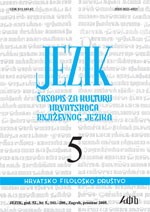Jezik kao ideološko-politički simbol (Srpska stranka u jezičnim previranjima u austrijskoj Dalmaciji 80-ih godina XIX. st.)
Language as an Ideologically-Political Symbol (The Serbian Party in the Language Turmoil in Austrian Dalmatia in the 1880’s)
Author(s): Tihomir RajčićSubject(s): Historical Linguistics, South Slavic Languages, 19th Century, Philology
Published by: Hrvatsko filološko društvo
Keywords: Language as an Ideologically-Political Symbol; Serbian Party; Language Turmoil; Austrian Dalmatia in the 1880’s;
Summary/Abstract: In this paper, the author investigates the ideologically-political aspects of the Serbian Party’s linguistic views in Austrian Dalmatia in the 1880’s. The author observes that the Serbian Party had inherited the language standard created by Karadžić on the basis of the idea that all štokavians are Serbs. This language, in such form, was considered to be the carrier of the „national spirit”, not only among the Serbs – in fact, this name was used for all speakers of middle-South-Slavic organic idioms – but among all Southern Slavs. In that context, Croatian was negated to exist as a separate language. Such linguistic views of the Serbian Party were welcomed by the Dubrovnik „slovinci” and by Dalmatian autonomists, whereas they were rejected by the supporters of the People’s Party and the Party of Rights. The presented facts lead to the conclusion that for the Serbian Party the language was primarily a nationally-political symbol, while its socially-communicational role was of secondary importance.
Journal: Jezik: časopis za kulturu hrvatskoga književnog jezika
- Issue Year: 52/2005
- Issue No: 5
- Page Range: 171-182
- Page Count: 12
- Language: Croatian

